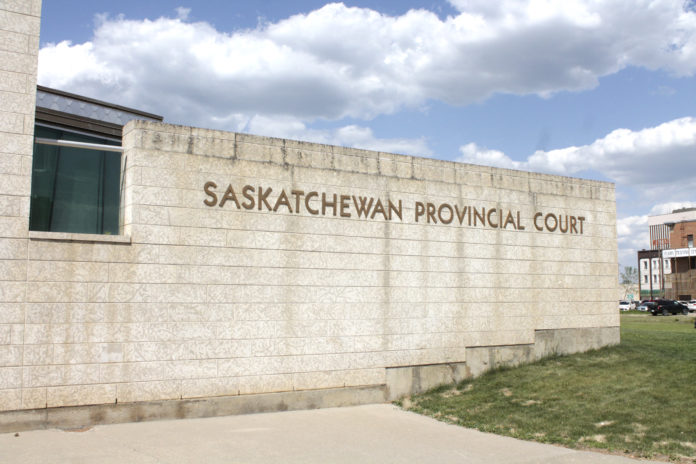The defence lawyer for a Prince Albert police officer on trial for impaired driving says crown witnesses are unreliable because they have an incorrect understanding of how alcohol consumption affects people.
Defence lawyer Mike Owens and crown prosecutor Bill Burge presented their closing arguments in the trial of Const. Brett Henry at provincial court on Tuesday.
Once proceedings started, Owens took aim at key witnesses who testified that Henry was too drunk to drive during visits to three local establishments on the night of March 2 and early morning of March 3. Owens argued that many members of the public mistakenly think people are automatically impaired if they have a few drinks. He said they fail to take into account things like the body weight of the person drinking, which affects how alcohol is absorbed by the body, or the total alcohol content of the beverages consumed.
“Ounces (consumed) isn’t as important as what’s in those ounces,” Owens told the court. “Ounces isn’t as important as what quantity of alcohol is in them…. The question is, what is the alcohol content of those ounces?”
The strength of the alcoholic beverages ordered has been in doubt, since there are disagreements among staff at one of those three establishments over which drinks Henry ordered. The crown did provide video showing employees at the establishment in question making the drinks, but the video does not show which patron they were delivered to.
Owens never denied Henry was drinking during the time in question. He instead argued that crown witnesses based their testimony on the volume of alcohol consumed and not how it affected Henry.
He added that Henry was taking medication at the time, which may explain his behavior, and only called for a ride as a precaution.
“Calling for a ride is hardly an admission of guilt. It’s a statement of, ‘better safe than sorry,’” Owens said. “It’s what SGI wants us to do.”
Owens also questioned reporting in the “local paper,” which he said oversimplified the case for the general public, as well as the issues of alcohol consumption and impaired driving.
The defence pointed out that with little video evidence of Henry weaving down the street while driving and no breathalyzer samples, witness testimony was all the crown had. Of all the witnesses of testified at the trial, the one who knew Henry best said she didn’t think he was drunk. Owens argued the evidence was equivocal, and therefore inadequate to secure a conviction.
While Judge Hugh Harradence remained sympathetic to some arguments, especially those concerning reasonable doubt, he had little time for Owens’ assertion that the views of the public and the media had anything to do with the case.
“I’m not going to decide this case by what’s reported in the local media. I’m going to decide it based on what’s written right here,” he said while holding up court documents from the bench.
When Owens breached the subject again Harradence replied, “I don’t care what the public says (about impaired driving),” and again reiterated that it was not relevant to the case at hand.
After a short recess, crown prosecutor Bill Burge spent most of his time defending witness testimony and going over security video footage of Henry taken at the three different establishments.
Burge dismissed arguments that the 13 crown witnesses, which included bartenders, waitresses and police officers, would be unable to tell if someone was drunk. He also repeated testimony from one witness who said Henry was “noticeably stumbling,” and another who said Henry was “not very steady on his feet.” A third witness worried Henry was too drunk to drive and offered to call him a cab, while another said Henry needed help finding his wallet and paying while leaving one of the establishments.
Burge called these testimonies “common sense observations,” especially since unconnected people at different establishments said he behaved the same way. He also narrated security tapes of Henry taken throughout the night, which Burge said showed a man with “gross signs of motor impairment” who was “showing advanced signs of impairment.”
Henry was front and centre in some videos, but in others he was barely visible. In one video, he just leans against the bar top for support while chatting with other patrons. Burge ended with security footage of Henry arriving at the first establishment early in the night.
“We saw a person who, in my submission, is completely different than the person who walked in and sat down at this table at the start of the night,” Burge argued.
The crown prosecutor took aim at the defence witness who said she knew Henry well and didn’t think he was drunk. This witness had testified that she didn’t like drinking or drunks due to her family history, and would not have socialized with Henry that night if she thought he’d been drinking.
“It strikes me as a very strange time to go to a bar if you don’t like drunks,” Burge said of the witness, who is on video chatting with Henry after midnight at one of the three establishments. “I’m not sure what else you’re going to see.”
After a brief debate, the court gave the defence the right of reply to the crown’s accusations. Among other things, Owens argued that security video was distorted and exaggerated due to the type of lens used, and added that they were just snippets that did not show the whole picture.
Judge Harradence is scheduled to give his final decision on Oct. 26 at 1 p.m.
Henry is a 13-year veteran of the Prince Albert police service. He was placed on administrative leave when the charges were announced in July 2017.


